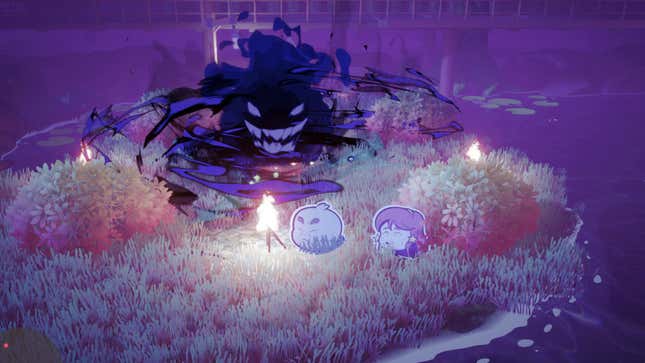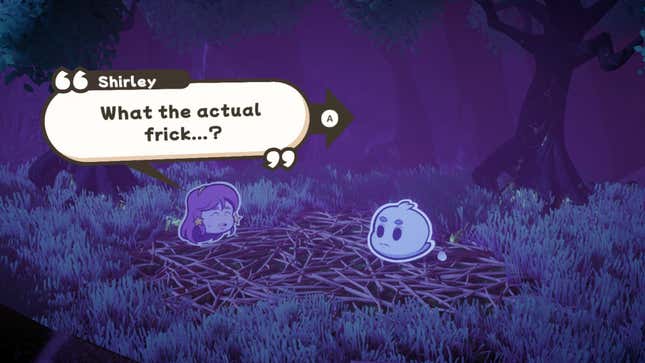
The Outbound Ghost is a charming turn-based adventure RPG that’s been garnering hype on social media thanks to its cutesy blend of The Legend of Zelda, Paper Mario, and Undertale mechanics. The paper mache game hit Steam in late 2022, but if you look for it there now, you won’t find anything because of a legal fight the creators find themselves in with their publisher.
The Outbound Ghost is this adorable Paper Mario-meets-Undertale turn-based RPG developed by the Switzerland-based studio Conradical Games. You play as an amnesiac ghost who, in the apparition-riddled town of Outbound, helps other ghosts find peace and ascend to heaven. There are abilities to gain, puzzles to solve, enemies to battle, and mysteries to uncover, all wrapped up in a lovingly animated and gorgeously rendered world reminiscent of something like 2020's Paper Mario: The Origami King. Unfortunately, while it is still available on some digital storefronts, developer Conradical Games is in the process of trying to pull The Outbound Ghost offline everywhere in the wake of a lawsuit filed against them by Digerati.
What’s the history between developer Conradical Games and publisher Digerati?
Initially, Conradical Games was in charge of creating The Outbound Ghost for PC, which Digerati was then meant to distribute onto other platforms, per the licensing agreement viewed by Kotaku. The Outbound Ghost released on PC in July 2021, with ports for PlayStation, Switch, and Xbox dropping about a year later. However, Conraidcal Games claims those console versions, worked on by an undisclosed third-party porting company, were not of the caliber as the original PC game.
The perceived drop in quality led lead developer Conrad Borrell to advise folks to “not buy any publicly available version of The Outbound Ghost because it is not up to the quality standards of the games” Conradical Games develops in a YouTube video posted in December 2022.
Digerati sues Conradical Games for breach of contract

Digerati filed a lawsuit against Conradical Games the day after Borrell’s YouTube video went up for “defamatory” statements, like Borrell telling a fan that he’s “doing everything in [his] power to do what’s right” or telling another fan they were approaching a game-breaking bug, as well as “a breach of contract” for an estimation that “exceeds the sum of $75,000.”
In a statement provided to Kotaku via email, a Digerati spokesperson said it was aware of the videos Borrell had been posting online that contained “several falsehoods about the ongoing dispute” between the developer and the publisher regarding The Outbound Ghost. The spokesperson clarified that Digerati was “very disappointed” in Borrell airing these grievances in public, noting the matter is currently in the hands of Digerati’s legal team.
“Digerati totally refutes Conrad’s statements,” the spokesperson said. “Conradical has been timely paid all royalties due to date. Digerati advised Conrad of such payment several hours before
he posted the video on February 16. Conrad also accuses Digerati of not reporting certain royalty payments. This is another falsehood. We provided Conrad with all statements for each revenue source. We have offered a full audit of our books to Conradical’s legal team. They have not exercised this option, but Conrad continues to assert these false claims.”
The spokesperson also pointed out that Borrell has advertised other games while “promises made to earlier Kickstarter backers of The Outbound Ghost have not yet been honored.” They went on to say that Borrell “has not attempted to work with Digerati” to get backers their game codes and made explicit mention of the performance on The Outbound Ghost on consoles.
“Conrad’s comments about the performance of the game [are] also noted. While the porting is the responsibility of the publisher, it goes without saying that publisher, porting team, and developer need to work together to iron out any bugs and so we can provide the game that everyone wants. We asked Conrad to help identify bugs or issues; however, Conrad has refused to work with us or communicate with Digerati on any channel.”
The Outbound Ghost gets DMCA’d by its developer
Now, Conradical Games is issuing DMCA copyright strikes against its own game. The studio said in a new YouTube video earlier this month that it is going to each platform—think Sony and Xbox’s storefronts or Nintendo’s eShop—showing that Conradical is the owner of The Outbound Ghost and that Digerati is “committing copyright infringement” by keeping the page up on some digital store shelves without the studio’s permission. Borrell hopes to get The Outbound Ghost removed from sale and taken offline in its entirety. While there are “no plans to counter-sue” for now.
“Why are we making this video and not taking care of this matter privately? Well, we’ve tried. The publisher is not complying,” Borrell said in the February YouTube video, though it’s unclear what issue he is referring to not being complied with. “So we are doing this so that people know we are not responsible for the faulty console versions, as well as trying to find a way to regain control of the [digital] storefronts.”
While the licensing agreement allowed Digerati to publish and distribute the game, the company does not own it. Borell said in the February YouTube video that Digerati pushing The Outbound Ghost on platforms like the Epic Games store, the Nintendo eShop, and the PlayStation store constitutes a direct breach of contract. Borrell brought up three additional issues in the video as well that broke the contract: the lawsuit Digerati filed against Conradical Games, the outstanding payments Digerati has yet to fulfill, and the revenue Digerati has reportedly “underreported,” according to Borrell.
Meanwhile, Borrell said the studio’s future plans include releasing more games (such as the action roguelike Soul Stalker) to “make a living” while self-publishing The Outbound Ghost (and other games) to maintain creative and distributive control.
In Discord messages with Kotaku, Borrell said he is “severely disappointed” with the situation and hopes to get things back on track.
“We put so much time, love, and effort into this game,” Borrell told Kotaku. “Being in a situation like this is never pleasant, especially when it relates to one’s own work. I’m a game developer, my job is to make games, not to spend all this time dealing with legal matters.”
Borrell reiterated that although the ongoing legal battle has restricted what he can put on the record, he has “learned a lot about the legal system” in the wake of the lawsuit. This includes “the importance of legal counsel” as well as how vital it is to have “a great legal team.”
“The reality is that a contract is only as honorable as the person signing it, and people are not always who they seem,” Borrell said. “You can have the law 100 percent on your side, but if you don’t have hundreds of thousands of dollars you won’t have the resources to make it count. There are of course good publishers out there, but over the past months, many other developers with the same, and different publishers, have reached out to tell me similar horror stories of not being paid, being threatened legally, and so on. The worst part is that they can’t do anything because they don’t have hundreds of thousands of dollars to go through the legal system. They’re basically being held hostage.”